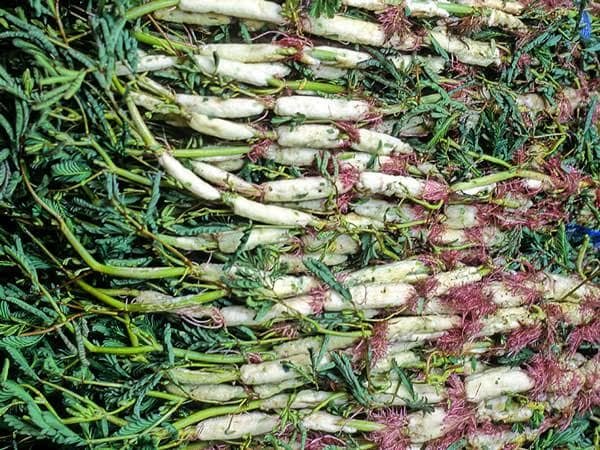Do you know Ekai Thabi? Farmers are able to earn lots of money just by growing Ekai Thabi in wetlands. In Manipur, farming Ekai Thabi in a small pond can earn Rs 50000 per season.
Water Mimosa is known as Ekai Thabi in Meeteilon. Some called it Eshing Ekai Thabi as well.
Ekai Thabi is an aquatic perennial herbs which is grown floating on water bodies. It is fast growing herbs and found in South East Asian Nations like Myanmar, Thailand, Vietnam, Laos, Cambodia, Indonesia and China.
Ekai Thabi in our food recipe
You can eat Ekai Thabi as raw, cooked or boiled. In every Manipuri kitchen, this herb is used in four different dishes. The raw Ekai Thabi stems are eaten as Morok Metpa (with Chillies) and as one of the favorite recipe as Ekai Thabi Singju.
The stems are boiled to be eaten as Eronba with Ngari (fermented fish) and frying in oil as Kanghou with potatoes and other green vegetables.
The taste and aroma of Ekai Thabi is similar to Yongchak, Parkia. So, foodies are using Ekai Thabi when the season for Yongchak was over.
Market potential of Farming Ekai Thabi
Ekai Thabi grows in warm, stagnant ponds, slowly moving streams during rainy seasons. The best season for growing this herb between May and September.
After growing, it takes 3 months to flower. Therefore, by July, this herb is available in the local market for sell. This local herbs is very tasty and people buys it once it reaches the market.
A bundle of Ekai Thabi, having 4-5 stems of around 10 inches costs Rs 50-100 in Ima Market.
Why you should eat Ekai Thabi?
Ekai Thabi is nutritionally high in Calcium. A serving of 100 grams consists around 387 mg of Niacin. Niacin plays an important part within the metabolism of living cells.
It is involved in both DNA repair and production of steroid hormones within the adrenal glands. Besides, Ekai Thabi contains up to 5.3 gram of fiber for each serving of 100 grams.
The raw juice extracted from this herb are used for medicinal purposes. Whole plant extract exhibited cytotoxic activity on somatic cell lines. The green leafs are also used in the treatment of dysentry and other intestinal remedies.
Researchers suggest that Ekai Thabi is anti oxidants, anti cancer and anti microbial in nature. Other health related benefits are also accepted by the food researchers.
In some Countries, this plant is used to treat waste water and polluted water bodies as well.
How much profit you will get from this herbs?
In Manipur, Ekai Thabi is planted in ponds. Every Manipuri family having a small courtyard Ekom (ponds) have Ekai Thabi.
Commercially, this herb is grown in wet lands where cultivation of paddy is not successful. Farming Ekai Thabi is very profitable.
If you have low lying lands which cannot be sued for kithe gardening or fishery ponds, grow Ekai Thabi.
From one sangam of land, which is around 0.62 acres, a farmer can easily get Rs 50000 to Rs 80000 per season.
Ekai Thabi are seasonal herbs and matures well within 5 months. This is the fastest growing herbs and no other crops could earn that huge amount within a short time. Maintenance of the herbs is also very simple and does not require much labor.
Do you want to try farming Ekai Thabi?
If you want to try growing this herbs, you may contact us. We will provide the plants and other required inputs.
You don’t need to worry about the market. Women vegetable vendors are searching for this herbs to buy in bulk.
The best thing for Ekai Thabi is that you can dry the stems and preserved for future consumptions.
One thing, never grow Ekai Thabi along with fishes in the ponds. Fish will eat away all the white fibrous spongy stems. This will kill the plants.
So try farming Ekai Thabi!

Naorem Mohen is a natural farmer, full-time blogger, and entrepreneur dedicated to promoting Manipur’s black rice Chakhao, local beverages, and edible mushrooms.
